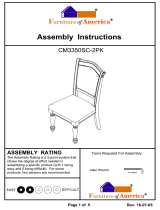Questions & Answers about Proposition 65
• What is Proposition 65?
Proposition 65 requires businesses to provide warnings to Californians about significant exposures to
chemicals that cause cancer, birth defects or other reproductive harm. These chemicals can be in the
products that Californians purchase, in their homes or workplaces, or that are released into the
environment. By requiring that this information be provided, Proposition 65 enables Californians to
make informed decisions about their exposures to these chemicals.
Proposition 65 also prohibits California businesses from knowingly discharging significant amounts of
listed chemicals into sources of drinking water.
Proposition 65 requires California to publish a list of chemicals known to cause cancer, birth defects or
other reproductive harm. This list, which must be updated at least once a year, has grown to include
approximately 900 chemicals since it was first published in 1987.
• What types of chemicals are on the Proposition 65 list?
The list contains a wide range of naturally occurring and synthetic chemicals that include additives or
ingredients in pesticides, common household products, food, drugs, dyes, or solvents. Listed
chemicals may also be used in manufacturing and construction, or they may be byproducts of chemical
processes, such as motor vehicle exhaust.
• What does a warning mean?
If a warning is placed on a product label or posted or distributed at a workplace, a business, or in rental
housing, the business issuing the warning is aware or believes that it is exposing individuals to one or
more listed chemicals.
By law, a warning must be given for listed chemicals unless the exposure is low enough to pose no
significant risk of cancer or is significantly below levels observed to cause birth defects or other
reproductive harm.
• Where can I get more information on Proposition 65?
If you have specific questions on the administration or implementation of Proposition 65, you can
contact OEHHA's Proposition 65 program at P65.Questions@oehha.ca.gov, or by phone at (916) 445-
6900.
Do not clean furniture with harsh cleansers or polish.
Do not write on furniture without a padded barrier to protect the surface.
To obtain the longest lifespan of your outdoor products, avoid extended and
lengthy exposure to rain, snow, and direct sunshine. Whenever possible cover the
product and /or place under patio or awnings.
To obtain the longest lifespan of your outdoor prodcts, minimizing exposure to direct
sunlight is recommended.
Not for commercial use. For residential use only .
Stains may be removed with mild soap solution and damp cloth.
Dust and pick-up spills using a clean, non-colored, lint-free cloth .
Children should not climb or jump on the furniture.
Keep away from sources of ignition.
Do not clean furniture with harsh cleansers or polish.
Do not put hot items directly on furniture surface
Do not write on furniture without a padded barrier to protect the surface.
To obtain the longest lifespan of your outdoor products, avoid extended and
lengthy exposure to rain, snow, and direct sunshine. Whenever possible cover the
product and /or place under patio or awnings.
To obtain the longest lifespan of your outdoor prodcts, minimizing exposure to direct
sunlight is recommended.
Not for commercial use. For residential use only .
Stains may be removed with mild soap solution and damp cloth.
Children should not climb or jump on the furniture.
Keep away from sources of ignition.

























